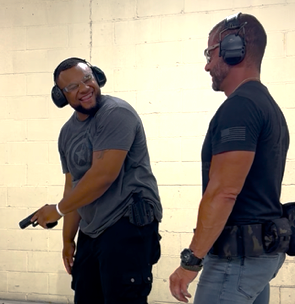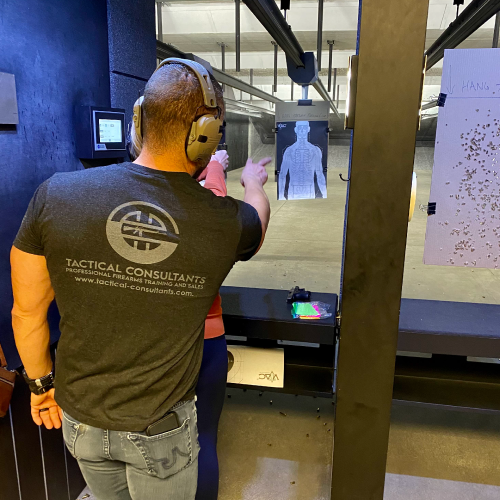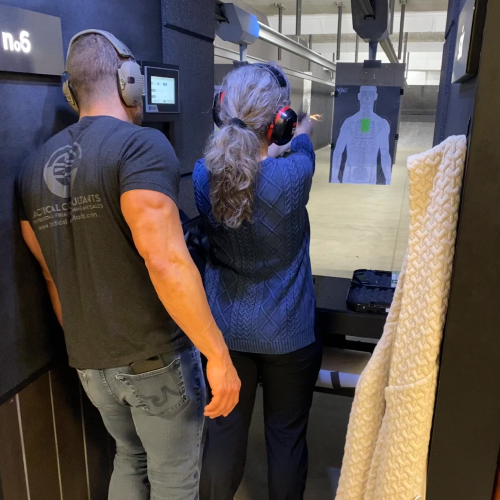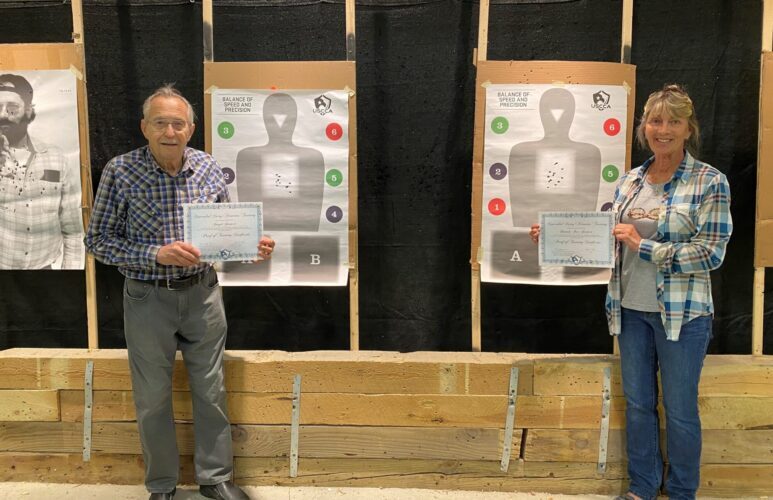MORE DETAILS
Private one-on-one training is $125/hour with a discount at eight hours for $900. Semi-Private groups of two or more are charged at $100/hour per person. Benefits to private training include:
- The session can be customized to meet your individual needs/interests, once skill level/shooting proficiency is confirmed
- 1/1 training will provide you with the complete attention of your instructor
- Students will fire more ammunition than a regular class size of 7 or more, having to wait for multiple squads on line
- We will provide 1/1 students with a full debrief of their training day and a dry fire program to practice at home
- Returning 1/1 clients will have access to further online services/debriefs/coaching/etc
- 1/1 clients will also receive the opportunity to purchase and commit to 10, 2-hour sessions, discounted at 5%
- In addition, 1/1 and small group clients will receive some listed discounts to newly purchased firearms through Tactical Consultants
RULES & POLICIES
Cancellation Policy
When enrolling in a training program with Tactical Consultants LLC, you are making a solid commitment to training on your chosen class date/time. We believe it is unfair to other clients waiting to enroll when there are last-minute cancellations or no-shows when that space could have been occupied by another student. This policy is firm and the tuition sale is final. There will be no refunds for students who fail to show or cancel their training. We do offer credit to a future class or a full refund in the unlikely event that Tactical Consultants must cancel the training.
Additional Rules & Policies
- A valid photo, government-issued ID in addition to the student acknowledging they are allowed to own/possess a firearm.
- Students will be required to complete a very thorough Participation Agreement and Release of Liability prior to participation in any training.
- Minors are not permitted to attend any Tactical Consultants training unless previously scheduled as a private, 1/1 training with the student and parent or guardian present at all times.
- Students will need to review and have a working knowledge of the Cardinal Safety Rules
- There are course prerequisites: Pistol Phase 1 is a prereq for Phase 2 pistol and AR-15 Phase 1 is a prereq for Phase 2 AR-15. There is no prereq for Concealed Carry and Home Defense, Intro to Handgun, Intro to AR-15, or Shotgun.
Private Firearms Instruction
$125.00
Private one-on-one training is $125/hour with a discount at eight hours for $900. Groups of 2 to 4 students are charged at $100/hour per person. Rates are dependent on course curriculum and range venue. Private and group training can be adjusted and custom modified to meet the needs of the client. Private Law Enforcement training is available upon request.
Please Contact Us For Details
TESTIMONIALS
WHAT CLIENTS ARE SAYING.
FAQs
Frequently Asked Questions
Who is allowed to attend training and what are the basic requirements?
A valid photo, government-issued ID in addition to the student acknowledging they are allowed to own/possess a firearm. Students will be required to complete a very thorough Participation Agreement and Release of Liability prior to participation in any training. Minors are not permitted to attend any Tactical Consultants training unless previously scheduled as a private, 1/1 training with the student and parent or guardian present at all times. Students will need to review and have a working knowledge of the Cardinal Safety Rules. There are course prerequisites: Pistol Phase 1 is a prereq for Phase 2 pistol and AR-15 Phase 1 is a prereq for Phase 2 AR-15. There is no prereq for Concealed Carry and Home Defense, Intro to Handgun, Intro to AR-15, or Shotgun.
What gear do I need for class?
Each class has its own gear list. You can see what is needed in the Required Equipment section on each class page.
What time do we start class?
Unless notified of a different time slot, all full and half-day training starts at 8 am sharp.
What if I don’t have a firearm?
For any class, it is highly recommended that you come to training with the firearm you use to defend your life so you become proficient with that gun. However, rental pistols are available for training if needed. AR-15s and Shotguns are only available for rent during private, 1/1 training.
Can I purchase ammunition?
Tactical Consultants sells ammunition for class but due to unforeseen ammunition shortages that come and go, please arrange this prior to your training date so that it can be made available.
Should I bring lunch/snacks?
Yes, for full days you will need to bring lunch, some snacks, and a full water bottle or two. During half-day training events, you will still need some snacks for fuel and plenty of water.
I enrolled and paid for a class, can I get a refund?
All training sales are final, there are no refunds given. Other students have waited for training when enrolled students cancel last minute or are no-shows. It is unfair to those students. Please do not sign up for a class if you believe there is a possibility you may cancel.
When attending a rifle class, should I have my rifle setup complete and zeroed?
Yes, please have your rifle set up the way you want to train with it and have it zeroed for a 50/200 yard zero, other zero distances are acceptable and we can help fine-tune your zero during the first hour of training.
What are Tactical Consultants Cardinal Rules?
1. Always treat every firearm as if it were loaded, even after you have confirmed it is unloaded. Over the many years of working in firearm instruction, both with law enforcement personnel and private citizens, I must shake my head at the many accidents that occur and are labeled “negligent” or “accidental” discharges. These accidents occur, many resulting in death or grave bodily harm because the people handling the firearm are treating it as an everyday object, rather than a tool, capable of taking a human life. Once we place human intervention into the equation, these avoidable accidents occur with what should be an otherwise inert object. During my firearms instruction and while discussing the universal safety rules, I advise my students to not only treat every firearm as if it were loaded but more importantly, ALWAYS KNOW THE STATUS OF YOUR WEAPON! In other words, is your firearm ready to help protect you when it matters the most, at a second’s notice? A loaded weapon is not an unsafe weapon. It’s the individual handling the weapon that creates the unsafe situation. I always conduct press checks to confirm the status of a LOADED weapon. I am already considering the weapon loaded for the purpose of providing a safe environment for myself and the people around me, however, it’s the confirmation that I actually loaded it with a round in the chamber prior to holstering and trusting that weapon with my life when headed out for the day. This was drilled into me as a young police officer. Assuming the gun is loaded when finding yourself in a life-or-death incident, and a round is not chambered, well, that won’t fare well for your response to the critical incident you’re faced with.
2. Always point your firearm in a safe direction unless defending yourself or others. Pointing your firearm at an assailant may be the safest direction! Making the statement, “do not point your firearm at anything you're not willing to shoot, kill or destroy,” is not an accurate statement in my opinion. There are common situations where we will point our firearms in directions or at something “we do not wish to destroy.” With this universal safety rule, many instructors will use the laser rule, and I think that is a good way of conceptualizing the muzzle or barrel end of your firearm. With an imaginary laser shooting out from the end of your barrel, you want to prevent that laser from crossing paths with you or anyone else. A question you should ask yourself is when would the laser be “OFF,” where you may be able to point that weapon at yourself or a part of your body? Usually students will respond, it’s always ON. However, what about when a holstered pistol is on your hip or carried in the appendix position? The muzzle will be aiming directly at your hip, legs, calves, or feet. So, we can say that a properly holstered weapon’s laser is OFF until a person interacts with that weapon. My safety on a weapon is my self-discipline, training, and the holster that safely covers the entire trigger. In life, if something is about to drop to the ground such as a cell phone, or a valuable fragile item, our natural response is to attempt to catch it and prevent it from striking the ground. However, that is exactly what we don’t want to do with a gun. A weapon slipping from your grip, holster or otherwise, is out of control and the barrel is flying around pointing in multiple unsafe directions. So let it go. Attempting to catch it and inadvertently pressing the trigger is likely to happen and we want to avoid that at all costs. Most modern weapons of today are very safe and can take a considerable drop without discharging a round.
3. Always keep your finger off the trigger and staged high up on the frame until you are ready to fire. My first safety on a weapon is my trigger finger. My second, and stated above in rule #2, my holster is my external safety on my weapon. In my opinion, external safeties on every day carry firearms can present a problem for most people that fail to train and train frequently. In a high stress self-defense incident, you are not going to be thinking about disengaging a safety on a pistol. So having your trigger finger positioned high on the frame or slide is the best place, not along the trigger guard where I was taught during my law enforcement career. A sympathetic response and flinch can cause that trigger finger to retract and pull back into where your hand is making a fist, causing your index finger to press the trigger.
4. Always be sure of your target and consider its surroundings. Also, be aware of your entire surrounding area! Not just the backstop. This is the embodiment of situational awareness in a gunfight. Be sure of what is also left and right, as you must be paying attention to your entire surroundings. The ABSOLUTE APPLICATION OF SITUATIONAL AWARENESS. Like wolves, criminals will usually travel in packs and they typically don’t operate alone. At the very least, that is what we should be aware of and ready for. There may be additional threats to engage. Assaults, drug violence, robberies, home invasions, etc., any violent encounter, expect the assailants to be accompanied by another criminal or co-defendant. You may need to transition to the next target or threat level and continue to defend yourself and your loved ones. This rule is the absolute application of situational awareness while manipulating your firearm, by not only paying attention to the backstop but to your ENTIRE SURROUNDING. So, the ultimate goal at the end of the day is to survive and go home alive, not only for yourself but more importantly, for your loved ones.
5. Be attentive and careful all the time.
6. If you see a dangerous situation, report it to a range instructor directly.
7. Absolutely no use of drugs or alcohol. Instructors must be made aware of clients' use of prescription drugs that may cause a safety hazard.






